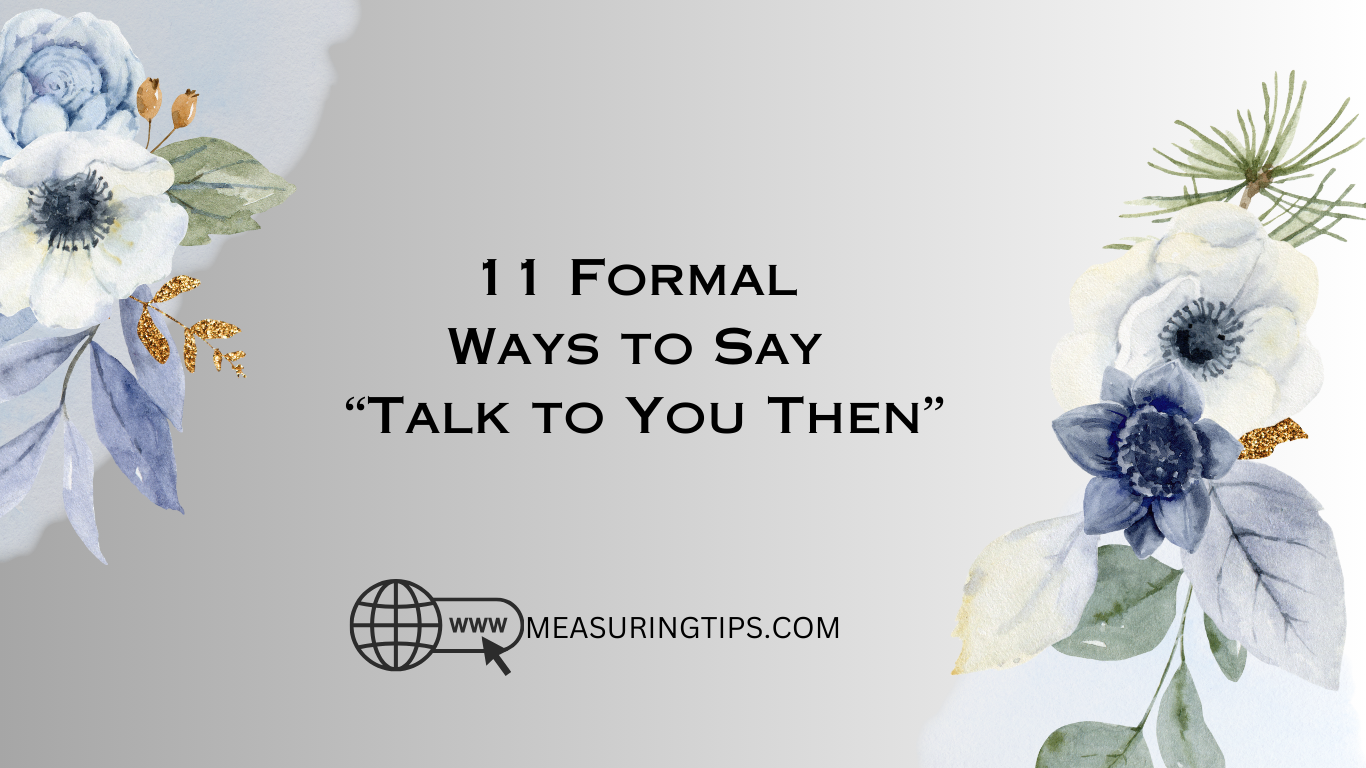
11 Formal Ways to Say “Talk to You Then”
In today’s fast-paced world, communication has become more important than ever. With the rise of technology, we are constantly connected and expected to respond quickly to messages and emails. However, there are times when we need to end a conversation or meeting with a formal and polite phrase. One of the most common phrases used is “talk to you then.” While this phrase may seem simple and harmless, it can come across as informal or even rude in certain situations.
In this article, we will explore 11 formal ways to say “talk to you then” that will help you end a conversation or meeting on a professional and polite note.
“I look forward to our next conversation”
This phrase is a great alternative to “talk to you then” as it conveys a sense of anticipation and excitement for the next conversation. It also shows that you value the other person’s time and are looking forward to continuing the conversation in the future.
Example: “Thank you for your time today. I look forward to our next conversation.”
“Let’s reconnect at a later time”
This phrase is a more direct way of saying “talk to you then.” It acknowledges that the conversation or meeting has come to an end and suggests reconnecting at a later time. It is a polite way of ending a conversation without making any commitments.
Example: “It was great catching up with you. Let’s reconnect at a later time.”
“Until we speak again”
This phrase is a formal and polite way of saying “talk to you then.” It conveys a sense of continuity and suggests that the conversation will continue in the future. It is a great way to end a conversation with someone you have a good rapport with.
Example: “Thank you for your insights. Until we speak again.”
“I’ll be in touch”
This phrase is a more casual way of saying “talk to you then.” It suggests that you will be the one initiating the next conversation or meeting. It is a great way to end a conversation with someone you have a close relationship with.
Example: “Thanks for your time. I’ll be in touch.”
“I’ll follow up with you soon”
Similar to the previous phrase, this one also suggests that you will be the one reaching out for the next conversation or meeting. However, it adds a sense of urgency by using the word “soon.” It is a great way to end a conversation when there are action items that need to be followed up on.
Example: “Let’s discuss this further. I’ll follow up with you soon.”
“I’ll get back to you at a later time”
This phrase is a more formal way of saying “talk to you then.” It suggests that you will be the one getting back to the other person at a later time. It is a great way to end a conversation when there are specific tasks or information that need to be shared.
Example: “Thank you for your time. I’ll get back to you at a later time with the requested information.”
“I’ll speak with you again soon”
This phrase is a more personal and friendly way of saying “talk to you then.” It conveys a sense of warmth and suggests that the conversation will continue in the near future. It is a great way to end a conversation with someone you have a good relationship with.
Example: “It was great catching up with you. I’ll speak with you again soon.”
“I’ll be in contact”
This phrase is a more formal and direct way of saying “talk to you then.” It suggests that you will be the one initiating the next contact. It is a great way to end a conversation when there are specific tasks or information that need to be shared.
Example: “Thank you for your time. I’ll be in contact regarding the next steps.”
“I’ll reach out to you later”
Similar to the previous phrase, this one also suggests that you will be the one reaching out for the next conversation or meeting. However, it is a more casual way of saying it and can be used in both formal and informal settings.
Example: “Let’s discuss this further. I’ll reach out to you later.”
“I’ll be in touch with you soon”
This phrase is a more formal and polite way of saying “talk to you then.” It suggests that you will be the one initiating the next conversation or meeting and adds a sense of urgency by using the word “soon.” It is a great way to end a conversation when there are specific tasks or information that need to be shared.
Example: “Thank you for your time. I’ll be in touch with you soon regarding the next steps.”
“I’ll speak with you again in the near future”
This phrase is a more formal and personal way of saying “talk to you then.” It conveys a sense of warmth and suggests that the conversation will continue in the near future. It is a great way to end a conversation with someone you have a good relationship with.
Example: “It was great catching up with you. I’ll speak with you again in the near future.”
11 Professional Ways to Write a “Nice to Meet You” Email
11 Other Ways to Say “I Hope You Had a Great Weekend”
Conclusion-Ways to Say “Talk to You Then”
In conclusion, there are many formal and polite ways to say “talk to you then” that can help you end a conversation or meeting on a professional note. These phrases not only show respect for the other person’s time but also convey a sense of continuity and anticipation for the next conversation. So next time you find yourself in a situation where you need to end a conversation, try using one of these 11 formal ways to say “talk to you then.”